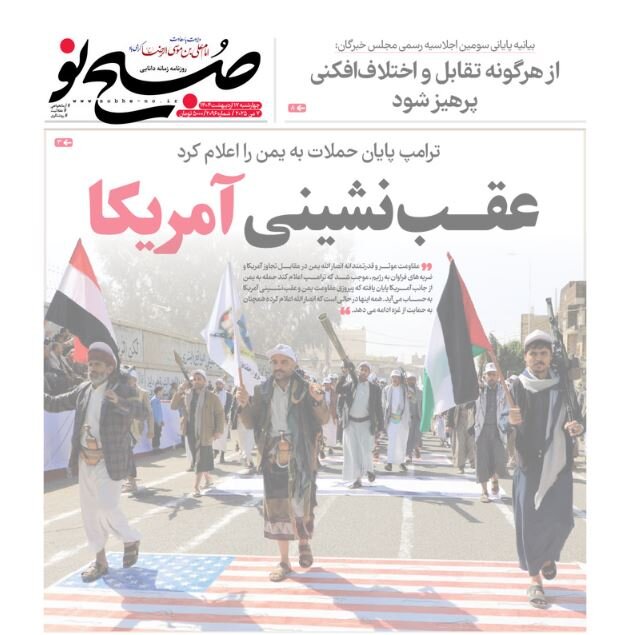In Tehran-Memo, Sobh-e-no discussed the resumption of nuclear talks days after the weekly postponement.
It writes: America is under the influence of Zionist lobbies and neocons. Additionally, Democrats are also waiting for Trump to make a deal and say, “It was JCPOA,” as Newsweek says. As a result, Trump has been under pressure from this point onwards. Even within his working group, some extremists believe that Iran could secretly raise levels of enrichment at any time after an agreement is reached. These issues have led to negotiations entering a new phase. But in reality, perhaps the most fundamental reason is that the change in the negotiation team. Because Trump and his diplomatic system are in an urgent and rush. Otherwise, we would have definitely seen in the media why Iran closed the door to negotiations, or witnessed more noise and threats. But one thing is very clear. Negotiations will continue.
Siasat-e-Rooz: Diplomatic Mediation
In his description, Siasat-e-Rooz dealt with Araghchi’s visit to Pakistan, writing: On the one hand, these tensions intensify the risk of war between the two nuclear forces, while on the other hand, terrorist groups’ abuse in this situation could further exacerbate the security of the region. The West claims that these movements are aimed at confronting China, but the truth is that they are setting fires against the entire region. Araguchi’s visit to Pakistan, and then to India, is a practical step for Iran to alleviate regional tensions, integrate its neighbours into terrorism, and address the roots of regional crises and foreign interventions. An approach that reveals all false claims of Iran’s comprehensive and security-building diplomacy and Iran’s isolation. It must not be forgotten that Iran and the Indian subcontinent enjoy historical relations, and that Persian language and culture have been a common basis between political parties for countless years. Today, this historical context serves as a strong point of Iran’s mediation and reduces tensions in the subcontinent. Tehran is key to regional stability and security and resolving tensions between its neighbors.
Farhikhtegan: Yemen’s attack has nothing to do with Iran and talks
In the analysis, Fahhictegan said the attack on Yemen’s Israeli Ben Gurion airport had nothing to do with Iran and talks. The paper said: Israel has recently experienced a series of defeats in confronting Yemenis. Meanwhile, there was a domestic response to this attack and its effectiveness. They believe the attack and its effectiveness has been linked to Iran-US consultations, which could have a negative impact on Iran’s consultations with the United States. In a media statement about a possible attack on Iran, the US president explicitly threatens to not stop Netanyahu if he enters a war with Iran, and Netanyahu explicitly threatens to target Iran’s nuclear facilities. In this situation, it is a big mistake to imagine that events like (missile) attacks on Ben Gurion Airport could disrupt consultations when the US president is facing Iran with all his tools. Regional balance laws that prevent resistance as a lead advocate and weakening of the Iranian axis cannot be considered a threat to negotiations.
Iran: Message of stability from Tehran to South Asia
Iran’s recent diplomatic initiative amid rising tensions between Pakistan and India can be assessed as a deliberate effort to reduce the crisis between two nuclear forces in South Asia. The initiative not only shows awareness of Tehran’s peripheral development, but also reflects Iran’s efforts to play an active role in managing regional crises through diplomacy. Due to their balanced relationship with both countries, Iran is in a unique position to play a mediating role. Iran is trying to prevent a widespread crisis and strengthen the role of the region through preventive diplomacy. From complex consultations on Syria to dialogue between Iraqi factions, Iran’s experience in managing regional crisis shows that Tehran’s regional diplomacy can help reduce tensions and establish effective channels of communication. Tehran is trying to continue to pave the path of diplomacy by maintaining a neutral stance and leveraging its capabilities to leverage efforts in line with Iran’s security, geopolitics and strategic interests.

